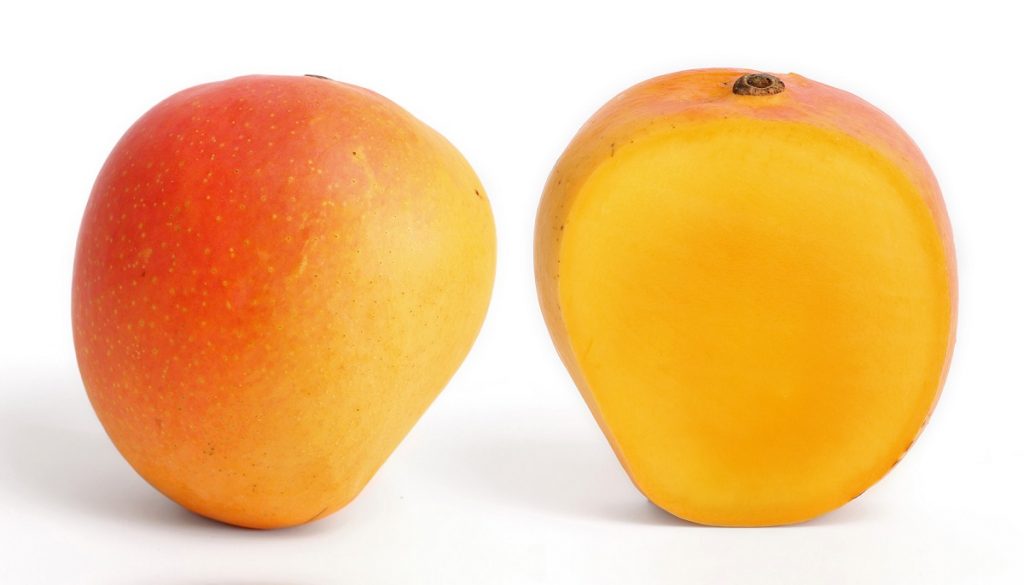
Mango was first cultivated in Southeast Asia. Usually, it is associated with tropical climates, but in fact, it needs a hot dry climate in order for it to grow. That’s the reason mango nourishes well in other climates such as South America, the Caribbean, Haiti, and Mexico. The United States imports most of its mango from Mexico. In 2017, the global production of mangoes (the report includes mangosteens and guavas) was 50.6 million tonnes, led by India with 39% (19.5 million tonnes) of the world total. Mango is the national fruit of India and Pakistan, and the national tree of Bangladesh. It is the unofficial national fruit of the Philippines.
Along with good taste, mango has many health benefits. They are rich with vitamins A and C. As a matter of fact, when the mango is still green, it has plenty of vitamin C. Contrariwise, when it ripens, it increases vitamin A content.
Mango has a sweet taste, however, the flavor, essence, and appearance of its flesh are different among its varieties, some have a tender, soggy composition similar to an overripe plum, while other varieties may have firmer, like a cantaloupe or avocado or a fibrous texture.
The skin of unripe, cooked mango can be eaten, but it has the potential to make contact dermatitis of the lips, gingiva, or tongue in sensitive people.
Pieces of mango can be crushed and utilized as a topping on ice cream or mixed with milk and ice as milkshakes. Sweet glutinous rice is flavored with coconut, then served with sliced mango as a dessert.
Mango Nutritional Information:
It’s so delightful when a fruit that tastes so ambrosial has so many wonderful nutrients in it. They are high in Vitamin C, Vitamin B6, Potassium, Copper and Vitamin A.
First, we mention the nutrition facts of mangoes; a whole peeled mango contains about 135 calories, 35g carbohydrates, and proteins and fats only 1g so this makes mango an ideal diet fruit. Mango has 4g of fiber which fulfills 14% of the RDA. Vitamin C is 57.3mg which provides 97% of RDA, so mango is a marvelous source of vitamin C and also vitamin A which is 1584 IU that makes 32% of RDA. Vitamin E is 2.3mg. Copper is 0.2mg, potassium is 323mg.
Mangoes are also blessed with several other important phytochemicals including Cryptoxanthin, Lutein, Gallic Acid, and Anacardic acid.
They are an amazingly a healthy snack. Rich with fiber, virtually fat-free, and mangoes contain several vitamins. Mangoes also contain beta-carotene which helps in slowing the aging process, also the risk of certain forms of cancer, make lung function better and cut issues regarding diabetes.
Mango peels are rich in phytonutrients, such as the pigment antioxidants like carotenoids and polyphenols.
Mango Health Benefits:
- Mango fruit contain pre-biotic dietary fiber, vitamins, minerals, and poly-phenolic flavonoid antioxidant compounds.
- Vitamin A in mango is also required for maintaining healthy mucus membranes and skin. Consumption of natural fruits rich in carotenes is known to protect body from lung and oral cavity cancers.
- Fresh mango is a great source of potassium which is an essential component of cell and body fluids that helps controlling heart rate and blood pressure.
- Mangoes contain vitamin C that helps body develop resistance against infectious agents and fight harmful oxygen free radicals. Vitamin B-6 or pyridoxine is required for GABA hormone production in the brain. It also controls homo-cystiene levels in the blood, which may otherwise be harmful to blood vessels resulting in CAD and stroke.
- Mango also contain some amount of copper which is a co-factor for many vital enzymes, including cytochrome c-oxidase and superoxide dismutase (other minerals function as co-factors for this enzyme are manganese and zinc). Copper is also needed for producing red blood cells.